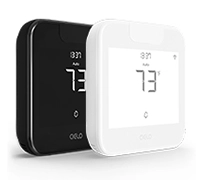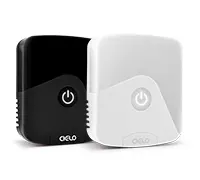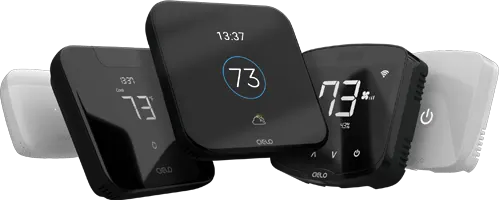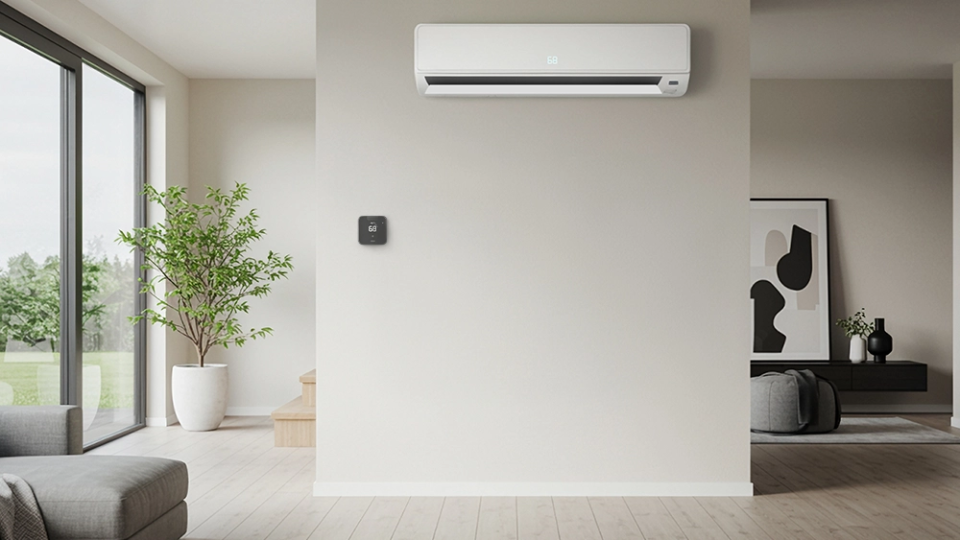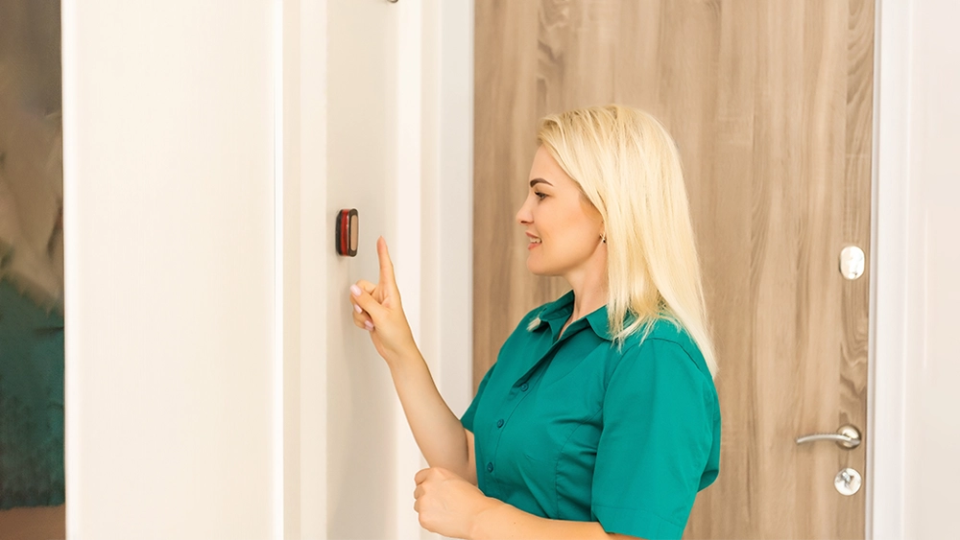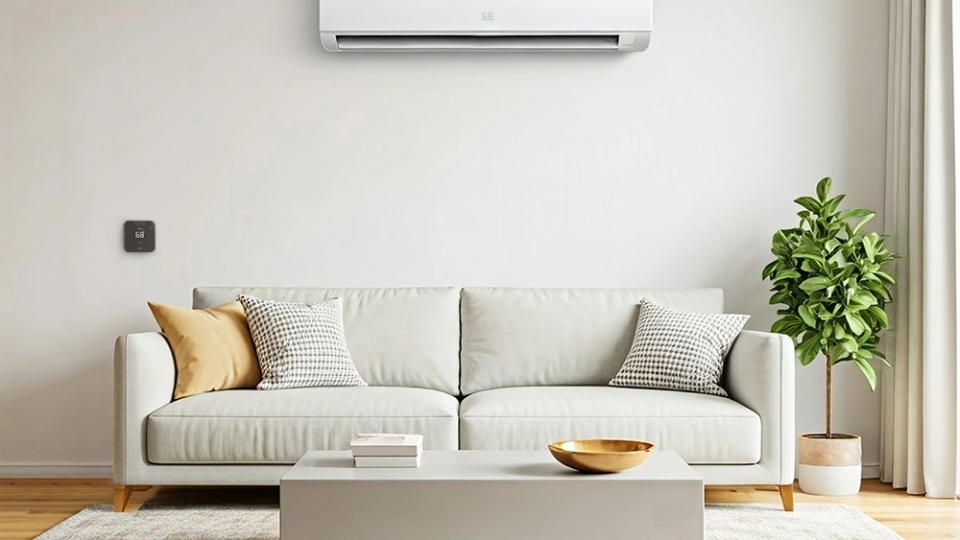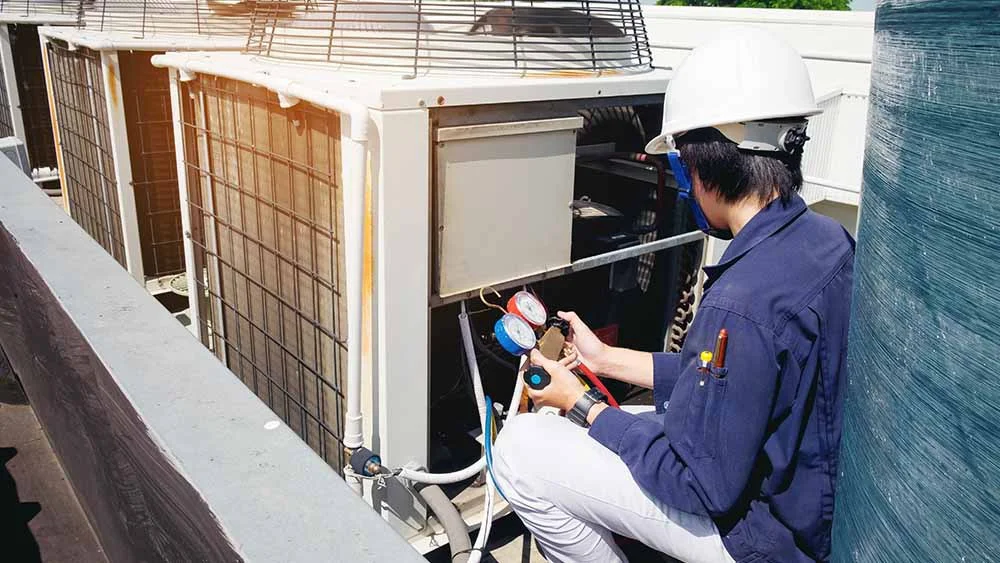
Key Takeaways
- HVAC inspection is a complete checkup of your unit to ensure it is functioning efficiently and safely.
- It involves checking the thermostat, refrigerant, fan, motor, ductwork, and electrical connections for optimal performance.
- Regular inspection boosts efficiency, lowers energy bills, and extends your system’s life.
Given the important role your HVAC system plays in ensuring your comfort, it’s essential to invest in its regular inspection. Without proper servicing, it will not only break down during extreme weather conditions but also cost you thousands of dollars in repairs or replacement. Regular HVAC inspection can help you avoid frequent service calls and hefty repairs, ensuring your system runs efficiently.
This blog will explore the key benefits of HVAC inspection and signs that indicate that your unit needs to be checked. Additionally, it will explain in detail what the inspection process of various HVAC units involves.
Let’s dive in and discover why professional servicing should be a priority for every homeowner!
- What Is an HVAC Inspection?
- Why Is It Important to Have Your Unit Inspected?
- Signs Your HVAC Unit Needs Servicing
- What Does an Air Conditioner Inspection Cover?
- What Does a Professional Heat Pump Inspection Involve?
- What Does Furnace Inspection Include?
- What Does an Air Duct Inspection Cover?
- HVAC Inspection Cost
- DIY vs. Professional HVAC Servicing
- Takeaway
- Frequently Asked Questions
What Is an HVAC Inspection?
An HVAC inspection process involves checking and testing every part of your system. A technician performs a host of tests to ensure every part of the system operates to its full capacity and is running smoothly as needed.
Inspectors will evaluate the basic function, workings, and cleanliness of each system component. This includes tasks like checking thermostat calibration, electrical connection fitting, refrigerant pressure, testing gas pressure, and more. They will also test safety features and assess the system’s estimated age.
Why Is It Important to Have Your Unit Inspected?
The HVAC system consists of various components that can be affected by dirt, wear, and environmental conditions over time. A neglected system can lose about 5% of its efficiency each year and have its lifespan reduced by 50%. Most HVAC systems come with warranties that stipulate regular maintenance to prevent costly repairs. Skipping or delaying these inspections could violate the warranty, leaving you responsible for expensive repairs if something fails.
Routine HVAC inspection is one of the most effective methods for boosting your system’s efficiency by identifying potential problem areas ahead of time and resolving them. After all, rectifying issues in time is far more cost-efficient than replacing the entire system.
You should also schedule an HVAC inspection after the installation of a new unit. A technician will check that your system is working properly without any issues. Also, If you are buying a new home, you should arrange for an HVAC inspection in addition to a standard home inspection before making a down payment. General inspectors may lack the specialized knowledge and tools necessary to identify HVAC issues, which a certified technician would be able to detect.
Signs Your HVAC Unit Needs Servicing
It is not uncommon for homeowners to fail to notice issues until they go wrong. Here is a list of indicators to help you identify the problem before it gets out of hand and prolong the life of your system.
- A sudden hike in your electricity bills can be a clear giveaway that your HVAC system is not performing as it should. When the system is less efficient, it will require more hours to achieve your ideal temperature. This causes your unit to run more, resulting in high energy consumption.
- Similarly, frequent cycling and a discrepancy between the reading on your thermostat and the actual temperature can also be signs that something’s wrong with your unit.
- The next time you start experiencing unexplained hissing, screeching, or rattling noises from your systems, don’t take them lightly. Consider these unusual HVAC noises a cry for help. They are often an indicator of a much larger problem building up.
- If your HVAC unit is producing unpleasant odors, it is high time you contact a technician for a check-up. A musty smell or a burning smell is not only a source of discomfort but can be dangerous if not dealt with immediately.
Note: If you experience a burning smell, shut down your HVAC unit immediately to prevent a fire risk and call the HVAC specialist immediately.
- Restricted or blocked HVAC airflow can result in ineffective heating or cooling, often due to filters that need to be cleaned.
- A system not working optimally sometimes fails to maintain ideal humidity levels. If the air feels stickier and humid, the inspection should be the right step to counter it.
- A faulty thermostat that cannot maintain your set temperature can lead to inconsistent heating or cooling.
Equip your HVAC system with smart features and achieve the perfect balance between comfort & savings.
Learn more
What Does an Air Conditioner Inspection Cover?
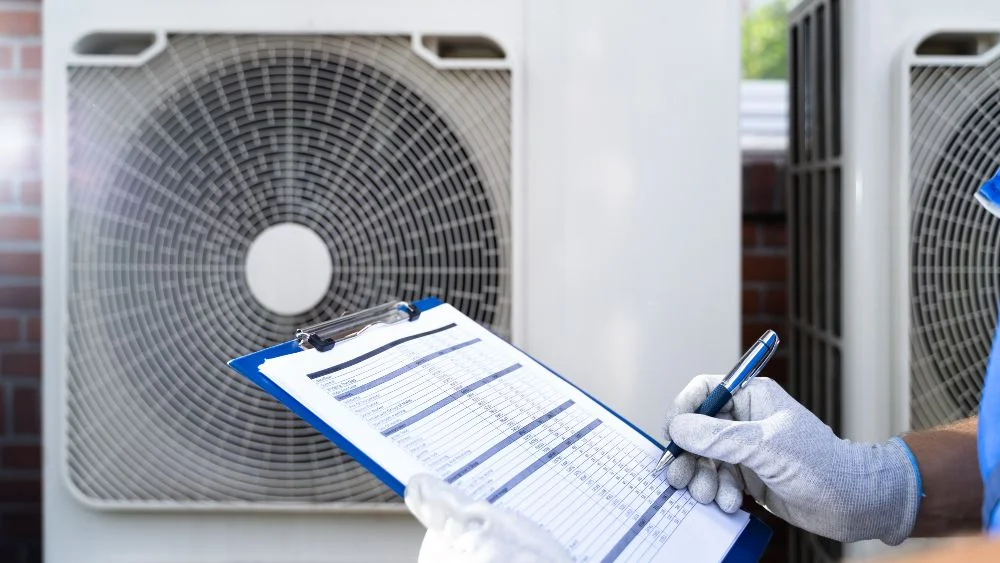
A standard HVAC inspection checklist will include checking all the key components of your AC system to ensure it operates efficiently.
-
AC Coils
The evaporator coils play a crucial role in absorbing heat and humidity from the indoor air. If they haven’t been cleaned in a while, you might notice that your AC is blowing warm air and your energy bills are increasing. The HVAC technician will thoroughly inspect and clean the coils during their visit.
Related: A DIY Guide to Cleaning Your AC Coils
-
Refrigerant Levels
When refrigerant levels are low, it can result in several AC issues, like freezing coils and warm airflow. Your inspector will check for refrigerant leakage and refill if required.
-
Drain Pan and Condensate Drain Line
The drain pan, located beneath the evaporator coils, collects excess moisture. Over time, it may corrode and develop cracks. Your inspector will evaluate its condition and replace it if needed.
The condensate drain lines are responsible for directing excess water from the drain pan outside your home. If these lines become loose, clogged, or damaged, it can lead to leaks. An inspector will closely examine all the drain lines and clear any blockages.
Related: AC Drain Line Clogged? Fix It in No Time
-
Outdoor AC Unit
Your inspector will visually check the outdoor unit, including the fan and motor, to identify any signs of damage or wear. If necessary, they will also lubricate the motor for smooth operation.
Related: How to Clean an Outdoor AC Unit: A Step-by-Step Guide
-
Electrical Components
Electrical issues can cause your AC unit to produce strange noises, blow warm air, and shut off unexpectedly. Your AC can also struggle to turn on if there’s an electrical problem.
Your HVAC inspector will assess the voltage and amperage of the motor capacitor, electrical connections, and wiring to ensure efficient operation.
What Does a Professional Heat Pump Inspection Involve?
The heat pump evaluation helps identify potential problems early and ensures that your unit delivers optimal performance year-round. It covers tasks like testing your thermostat, checking refrigerant levels, examining the reversing valve, and inspecting the heat pump fan and motor.
-
Thermostat
Your thermostat will be tested for proper functioning. The technician will ensure that it accurately reads the correct home temperature and calibrate it in case of any discrepancy.
-
Reversing Valve
The reversing valve is one of the key components of a heat pump as it is responsible for changing the mode from cooling to heating and vice versa. Your inspector will check whether it is working properly. If it is damaged, it will need to be replaced.
-
Refrigerant Levels
The HVAC inspector will check the refrigerant levels of your heat pump. Low refrigerant levels can lead to various issues, such as frozen coils and the heat pump struggling to maintain its optimal temperature. Also, leaking refrigerant is hazardous to health. In case of a leak, they will seal it and recharge the refrigerant.
-
Drain Pan
Your heat pump drain pan will be inspected for clogs or leaks. The technician will clean it thoroughly to ensure moisture can flow freely.
-
Electrical Connections
The HVAC technician will assess the electrical parts of both the indoor air handler and the outdoor condenser. This involves cleaning and tightening electrical connections. if they are covered in rust, they will have to be sprayed with rust-resistant lubricant.
-
Fan & Motor
The outdoor condenser fans should run smoothly without any squeaking sounds. If the belt is loose, the technician will tighten it, or if it’s worn, they may suggest replacing it. If the fan motor is not running smoothly, it will have to be lubricated.
Related: Your Ultimate Heat Pump Maintenance and Care Guide for 2024
What Does Furnace Inspection Include?
During the furnace maintenance, a technician will examine various components, including the furnace cabinet, thermostat, blower, and heat exchanger. They will look for signs of wear and tear, test safety features, and make sure everything in your furnace provides reliable heating in the winter season.
-
Furnace Cabinet
The furnace cabinet contains all the essential components of the furnace. The HVAC professional will inspect the structure to ensure it can protect your heating unit.
-
Thermostat
Your inspector will test the thermostat wiring and confirm that the heat activates and the thermostat accurately reaches the set temperature.
-
Furnace Blower
The blower wheel is responsible for circulating air throughout your HVAC system and into the ducts. If your furnace blower is dirty, it will struggle to perform its job, resulting in inadequate heating. The professional furnace inspection involves checking the blower and performing furnace cleaning if necessary.
-
Ignition System
The inspector will examine the ignition system, including the burners, flame sensor, and ignitor, closely. Accumulated dirt or debris can lead to cold air blowing or uneven heating. The inspector will also ensure that the pilot light is functioning properly.
-
Electrical Connections
Issues with your furnace’s electrical parts can pose safety risks. Your inspector will review all connections and check safety features. A critical component to inspect is the high-limit switch, which automatically shuts off the furnace if it overheats.
-
Venting and Heat Exchanger
Your inspector will evaluate the condition of the flue pipe, which expels harmful gases from your furnace to the outside. They’ll also check the heat exchangers that release warm air into your home. Any cracks or holes in these components can result in dangerous carbon monoxide leaks.
-
Gas and Carbon Monoxide Testing
Your carbon monoxide detectors will be tested to ensure they are operational and that you are protected in an emergency.
What Does an Air Duct Inspection Cover?
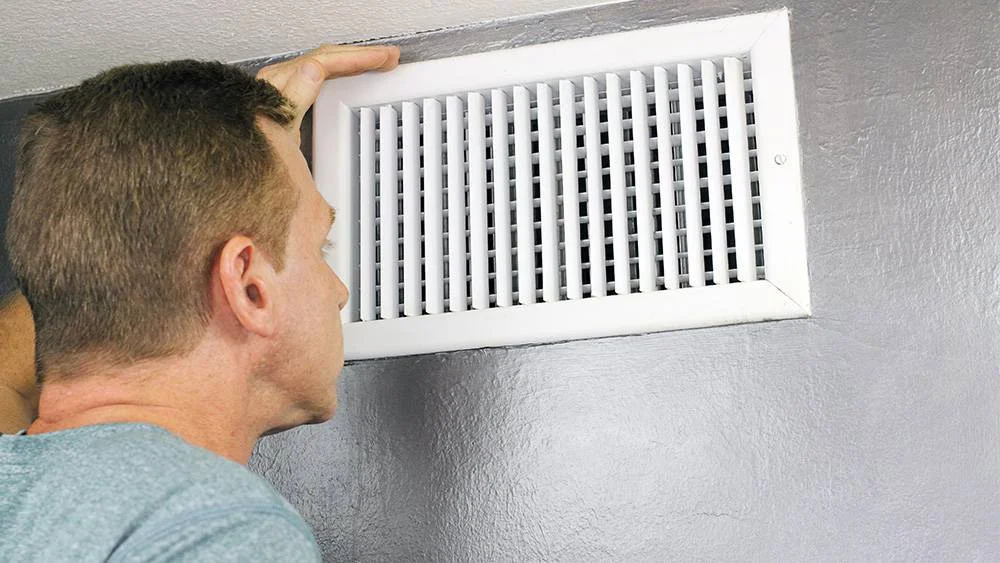
It involves assessing your unit’s airflow. The inspector will check for leakage and measure the air temperature at various vents in your home.
-
Duct Leaks
Leaky ducts prevent your unit from reaching your desired temperature, resulting in high bills.
The technician will start the duct inspection by visually checking for any sign of damage. After that, they will use special equipment to pressurize the ductwork and check airflow at pressure to see how much air is leaking.
-
Airflow Testing
This involves measuring the airflow at vents, grilles, and registers to ensure that the system distributes air evenly throughout the home.
-
Air Temperature
The HVAC technician will operate the unit for 15 minutes and then measure the temperature at one of the vents. They’ll repeat this process at various vents throughout the house to identify any temperature differences that could signal potential issues.
-
HVAC Mold Inspection
Technicians will look for signs of mold growth in the ductwork that may affect your indoor air quality.
HVAC Inspection Cost

The average cost of an HVAC inspection is $320, and you can expect to pay between $65 and $500.
The exact cost can vary by various factors:
- The type of your HVAC system: Complex units with multiple parts will incur more cost than simple units. To cut down on the cost, hire an inspector who charges a flat fee rather than an hourly fee.
- The size of your home: Larger homes are equipped with multi-zone HVAC systems or different heating and cooling systems.
- Location of your unit: If your unit is installed in an area that is hard to access, like crawl spaces or attic, that can increase the cost. Specialized equipment may also be required for a thorough inspection.
- Season: If you schedule the inspection during the peak season, you will have to pay.
| HVAC System | Inspection Cost |
| Furnace | $80–$100 |
| Air Conditioner | $75 –$150 |
| Heat Pump | $115– $240 |
| Air Duct | $80–$165 |
DIY vs. Professional HVAC Servicing
The idea of a free HVAC inspection might have led you to explore DIY options. You can do basic tasks yourself, like cleaning the filters, checking for unusual sounds and noises, and cleaning the outdoor unit. Make sure to turn off the HVAC circuit breaker before you handle any components.
As HVAC units are complex, it’s better to hire a professional for full inspection. They can identify problems that might not be apparent to someone without training. Investing in an HVAC inspection can help catch small issues before they develop into larger, more costly problems.
Takeaway
Regular HVAC inspections are crucial for maintaining the efficiency of your home’s heating and cooling systems. They can prevent minor issues from escalating into costly repairs. By scheduling the HVAC servicing, you ensure that your system operates at peak performance, ultimately extending its lifespan and enhancing your comfort. Also, don’t wait for a breakdown—schedule your inspection before the peak season starts, ideally in fall or spring, so your unit is in top shape when you need it the most.
Frequently Asked Questions
How Often Should You Have Your HVAC Inspected?
You should schedule your HVAC inspection twice a year, preferably in the fall and spring. Try to avoid summer and winter for these check-ups, as HVAC professionals are often swamped with repairs during those peak seasons. If you wait until then, you risk facing major issues without any cooling or heating when you need it most.
For heating systems, you should plan the inspection for late summer or fall. For your air conditioning unit, it’s better to have it serviced as soon as the weather starts getting warm.
How Long Does an HVAC Inspection Take?
In a residential area, a one-three zone HVAC system can take up to one and a half to two hours, considering the system does not have multiple serious issues. The time also depends on the type of system and the number of units you have in your home.
At the end of the inspection, the technician will provide you with a detailed report. It includes insights on each component that was checked and recommendations for maintenance to keep everything running smoothly in the future.

